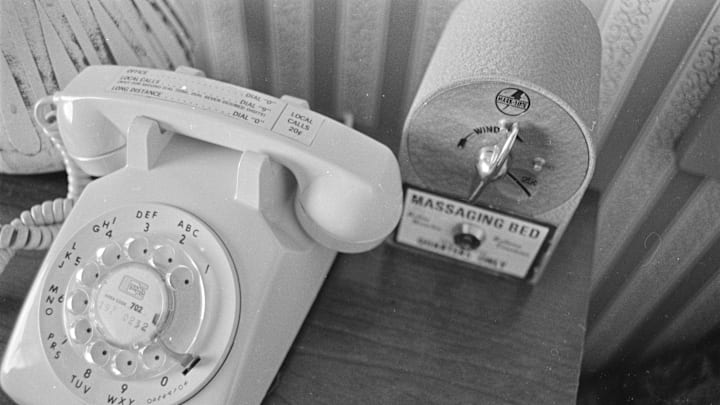When the interstate highway system began spreading out in the mid-20th century, American families went on road trips. So did weary business travelers. Something both of them could look forward to after a long drive was a motel room that featured a vibrating bed. For 25 cents, a motor would begin buzzing under the mattress, sending the guest into a state of convivial bliss for 15 minutes.
Today, few lodgings feature buzzing beds. Where did they come from? And what happened to them?
The idea of making a bed jostle and move—possibly to emulate the comfortable rocking motion found in chairs or in one’s first formative months as a baby—was made possible by electricity, with manufacturers combining a motor and mattress into one unit. But they were prone to breakdowns, not to mention expensive.
In 1958, vibrating bed salesman John Houghtaling thought he could do better. He separated the mattress from the motor, which made installation easier and the device cheaper. The unit clipped onto the box spring, giving it the freedom to be attached to virtually any bed. Dubbing his invention Magic Fingers, Houghtaling sold over a million of them to hotels by the 1970s, an era in which room amenities included things like heart-shaped beds.
At the time, hotels wanted to offer both the comforts of home—like a television—and things people couldn’t get at home. Magic Fingers salespeople installed the units, serviced them, and divided profits with the hotels.
The device became a kind of shorthand for a road-tired traveler who wanted a little comfort. In 1983’s National Lampoon’s Vacation, Clark Griswold (Chevy Chase) and wife Ellen (Beverly D'Angelo) collapse onto the mattress, only to have the vibrations force them to sleep on the floor.
“It was probably the first guest-room amenity after the TV, and almost ubiquitous in motels in the 1960s and into the 1970s,” Lodging Hospitality editor Ed Watkins told The Los Angeles Times in 2009, following Houghtaling’s passing.
But Magic Fingers was, in the end, a novelty. As the kitschy ‘70s gave way to the luxury-obsessed 1980s and beyond, hotels and motels opted for amenities like fluffy bath towels and deluxe pillow-topped mattresses. Because Magic Fingers charged a quarter, businesses also had to cope with rude guests trying to smash their way into the coin box.
By the 2000s, the presence of Magic Fingers was seen as more of a throwback retro feature, with few rooms equipped with one. Today, you'd be hard-pressed to find one, though the Roadrunner Lodge in Tucumcari, New Mexico, advertises a classic unit in their ‘60s-themed rooms. Enthusiasts can also buy a Magic Fingers for their home for about $80. And no, you don’t need a quarter.
